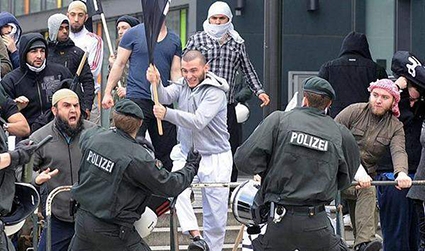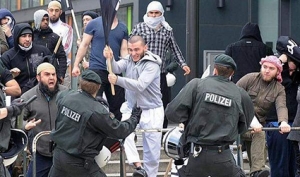Crime and the Legal System in Germany
Classified report of the German Police
Germany is preparing for another influx of refugees at the end of this year, according to Bild. In the fourth quarter, 920 thousand people are expected, meaning that, by the end of the year, the total number of migrants could reach 1.5 million. For comparison, last year the number of refugees amounted to 202 thousand. But if you take into account the facts of family reunification, and those refugees whose applications are satisfied and discharged to an additional 4 to 8 people, the number of migrants may exceed 7 million. In addition, German authorities believe that at least 290 thousand workers are on German territory without registration, that is, illegally.
In a secret report of the German police, given to journalists of the newspaper “Die Welt”, it is written that among the refugees are young people whose behavior towards the police can be described as “aggressive, disrespectful and contemptuous.” During arrest, they tend to resist the order of the ministers. Exactly the same attitude, the report said, is seen towards all other government institutions of Germany.
Add to this something that most Germans are afraid of - the increase in crime across the country. The threat of terrorist attacks is still high. Nevertheless, the authorities, in order not to provoke a further deterioration of the treatment of migrants, prefer to gloss over all the data.
For crimes committed last year in Germany, a record 38 thousand migrants were charged. Experts believe that this figure is only the tip of the iceberg and that at least the same number of crimes remains either undisclosed, or does not get reported.
According to experts, many migrants will never be able to integrate into German society, and will count on life at the expense of benefits, i.e. living on taxpayers’ money. And for a large part of migrants, stealing will become the only way to survive.
An indication of what may lay ahead is an incident that occurred on September 11 in the Saxon town of Freiberg. Two Libyans tried to steal at the grocery store Netto-Markt. Once caught red-handed by a security guard, they staged a fight and fled. But the story doesn’t end there: the Libyans quickly returned, this time armed with machetes and pepper gas, and began to threaten the sales assistants. When police arrived, the perpetrators pounced on the police who were forced to shoot into the air to calm the unruly attackers. One, a 27-year-old man, was detained while the other managed to escape.
The detainee was released after a few hours without charge. The next morning, he returned to the crime scene with his co-attacker. They took knives and threatened to cut off the heads of the store employees, the report said. Local journalists wrote that the prosecutor’s office ordered the police to release the detainee on the grounds that no aggressive act took place during the attempted theft. However, the Mayor of Freiberg, Sven Krueger, publicly condemned the inaction of the judicial system.
Local newspapers, meanwhile, wrote that such thefts occur in Freiberg daily and perpetrators are getting away with it.
The criminal world in Berlin runs the local show with a dozen gangs of Arabic origin. They rob banks and shops and sell drugs. When they have problems with the law, they bribe or intimidate witnesses.
According to the newspaper Der Tagesspiegel, 80% of violent crimes in Berlin are committed by foreigners. It is interesting that now thousands of the capital’s police are coming on duty without guns, forced to abandon them due to funding problems and now resulting in a police force with a lower level of training in shooting, and many lacking the skills to wield a firearm.
Police in Hamburg, Germany’s second city, are known to be unable to cope with the rapidly growing number of crimes committed by young immigrants from North Africa, and in fact have surrendered to the offenders. In Hamburg over a thousand young people from Africa arrived without their parents and now live on the streets, vigorously raising the level of crime in the city. Dealing with them is particularly difficult due to their status as minors.
Stuttgart police, too, are obviously unable to cope with migrants, especially with people from Gambia who openly sell drugs on the streets. In Dresden, workers from Algeria, Morocco and Tunisia took control of the area’s famous Wiener Platz, located in front of the main railway station. They sell drugs and rob passers-by. And, just as in other German cities, in the majority of cases they get away with it.
In the industrial center of Duisburg there are areas that the authors of the secret police report say are generally called “areas of lawlessness.” The police are afraid to stop there, because they know that they will most likely be instantly surrounded by 40-50 hostile natives from the Middle East or Balkans. The drafters of the report referred to such refugee conduct as a “deliberate challenge to the state.” Violators openly show their contempt for German society.
Writer, Franz Solms-Laubach, specializing in criminal issues, says that the German police are becoming increasingly demoralized before the rapidly growing crime. According to Solms-Laubach, foreigners living in Germany number about 10%, and the crimes they commit more than 25%. He believes that the way out of this situation is only one - migrants must understand that if they commit a crime in Germany, they will be deported to their homeland.
Perhaps the authors of the police report and journalists have exaggerated the situation, but the report is based on police reports. In any case, the forecast of increased in crime in Germany remains undoubtedly unfavorable.












